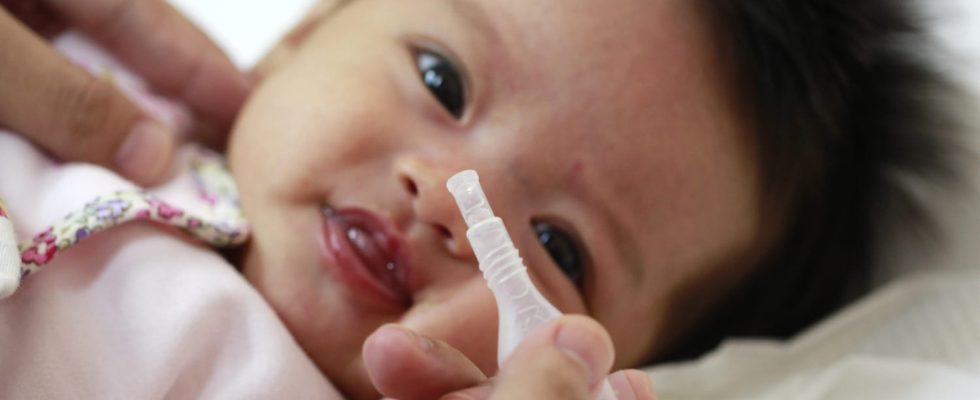Rotavirus is thought to be responsible for 14,000 hospitalizations in babies under 3 years old. It is the leading cause of gastroenteritis in children. Vaccination between 6 weeks and 6 months is recommended. What are the symptoms ? Treatments ?
Rotaviruses are the main culprits of acute gastroenteritis winter viral infections in infants and young children under 5 years of age, in whom they can lead to complications. In accordance with the vaccination calendar updated in April 2023 by the Ministry of Healthrotavirus vaccination is recommended for all infants aged 6 weeks to 6 monthsaccording to a two-dose vaccination schedule (at 2 months and 3 months of life) for Rotarix® and three doses (at 2 months, 3 months and 4 months of life) for RotaTeq®. They are administered orally. The HAS does not want to make this vaccination compulsory for the moment.
Definition: what is a rotavirus?
Rotavirus is a very common and highly contagious digestive virus which infects the intestinal cells, hurts the intestinal mucosa, produces a lot of water and prevents the intestinal cells (enterocytes) to absorb what is brought to them, what will cause gastroenteritis. It mainly affects babies and young children.
Contagiousness is really very important
Rotavirus is a virus quite resistant in the environment. He transmitted through the hands, through the stool and through all objects soiled by the stool : nappies, cuddly toys, toys, doorknobs, the bed. “If we do not disinfect and touch contaminated surfaces and then put our hands to our mouths, we will become infected with rotavirus, warns Professor Romain Basmaci. It is believed that there may be 1010 viral particles per gram of stoolwhich means 10 billion viruses per gram of stool. Contagiousness is really very important. Hence the importance of washing your hands regularly, before changing a baby, afterwards, and disinfect the changing table, keep toys and comforters away, wash the baby’s hands who may have put his hands at diaper level“.
What are the symptoms ?
Rotavirus infection causes gastroenteritis. The symptoms are:
- of the loose, watery, and profuse stools,
- often vomiting
- sometimes fever.
How long does the infection last?
Beyond 10 days, consult because prolonged diarrhea can cause dehydration
The infection lasts on average 4 to 5 days. Sometimes she can last 7-10 days. Beyond that, it is necessary to consult because the prolonged diarrhea having altered the digestive mucosa can lead to a difficult resumption of food and the need to change milk for small infants. “It is not the diarrhea itself that is dangerous, but the risk of dehydration. If the children have a lot of liquid stools but they manage to drink and eat, they manage to compensate for their losses. If this is not the case, the risk of dehydration exists. If this is mild, oral rehydration is most often possible. If it is moderate, a short hospitalization may be necessary for rehydration by nasogastric tube or intravenously., while severe dehydration will require intravenous rehydration in hospital. If treatment is late, this can be life-threatening“, nuance the head of the pediatric service of the Louis-Mourier hospital.
Since the symptoms of rotavirus infection are characteristic of gastroenteritis, the diagnosis is made very easily. No additional examination is necessary. The identification of rotavirus in the stools is of no therapeutic interest.
What are the risks of complications in the baby?
The main complication of gastroenteritis in babies is dehydration, which can be very serious and require hospitalization.
What complications in adults?
As in the child, theVomiting and diarrhea can cause severe dehydration. The best way to prevent this complication is drink regularly to compensate for water and salt losses.
What are the treatments for rotavirus?
“The best treatment is not to try to fight liquid stools or vomiting. The main thing is tobring water, salt and sugar. You have to bet on oral rehydration solution (ORS)available in pharmacies: 1 sachet to dilute in 200ml of water and give at will as long as the stools are liquid and there is vomiting. Give small amounts (20-30 mL) repeatedly because by not eating we are nauseous. Every 15-20 minutes. The very divided intake of small quantities of ORS will, in the vast majority of cases, make it possible to break vomiting, and promote effective rehydration. After 4 to 6 hours you can resume a normal dietthere is no food to avoid“, indicates the specialist.
Is there a rotavirus vaccine?
In France, there are two vaccines against rotavirus gastroenteritis: Rotarix® and Rotateq®. Their administration is recommended for all infants aged 6 weeks to 6 months.
► Rotarix®: two oral doses, one at 2 months and one at 3 months of life (respecting at least 4 weeks between each dose) Rotarix should not be administered before 6 weeks and after 24 weeks of life. The first dose of vaccine should be given before 16 weeks of age.
► RotaTeq®: three doses orally, one at 2 months, one at 3 months and one at 4 months of life (respecting at least 4 weeks between each dose). RotaTeq® should not be given before 6 weeks and after 32 weeks of life. The first dose of vaccine should be given before 16 weeks of age.
These vaccines, administered orally, can be co-administered with other vaccines in the infant’s immunization schedule. It is recommended to carry out the complete vaccination schedule with the same vaccine. It is recalled that vaccination against rotavirus should be postponed in infants presenting with diarrhea or vomiting, or having an acute severe febrile illness (taking care not to exceed the age limit).
► In immunocompromised infants: the vaccine should not be administered to children with known or suspected immunosuppression (including HIV infection), due to the risk of occurrence of severe cases of acute vaccine-strain rotavirus gastroenteritis in this population, these patients also having a risk of carrying the vaccine strain in the stool for several months.
Thanks to Professor Romain Basmaci, head of the pediatric department at Louis-Mourier hospital.
